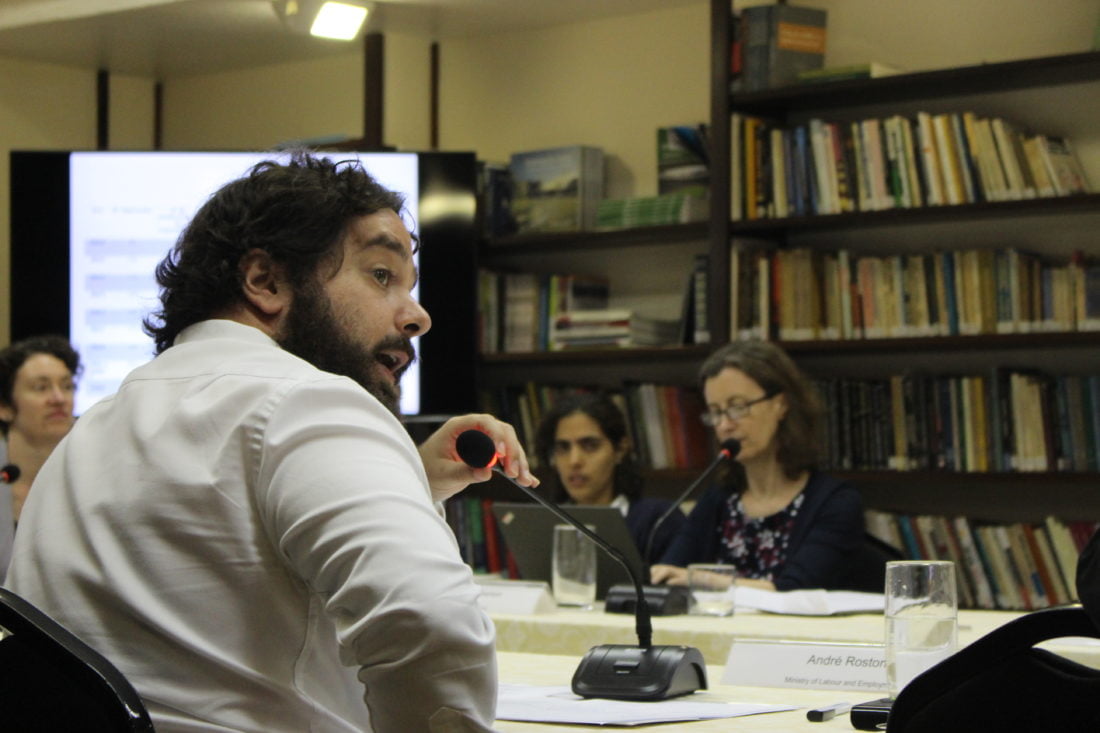
The Interaction of Socio-Environmental Requirements and Supply Chain Management
On April 24, 2018, the BRICS Policy Center hosted academics and professionals for the Workshop “The Interaction of Socio-Environmental Requirements and Supply Chain Management”. The purpose of the meeting was to promote a debate on how different types of international standards and domestic legislation affect the design and management of global supply chains.
The first panel, “Understanding the effectiveness of socio-environmental norms in global supply chains in the context of Brazil”, included Daniela Baccas from BNDES, Beatriz Domeniconi from GTPS, Nathalia Granato from IBÁ and Caio Borges from Conectas Human Rights. Daniela Baccas, head of the Environment Department of the National Development Bank (BNDES), spoke about the bank’s social and environmental responsibility actions. According to Daniela, the BNDES does not grant funding to those who are on the Dirty List of Slave Labor, in which the Ministry of Labor registers employers who have subjected workers to conditions analogous to slavery.
In addition, since 2014, the PRSA, Social and Environmental Responsibility Policy Implementation Plan, has been adopted, and it establishes social and environmental goals for BNDES and is updated periodically. The most recent PRSA, covering the years 2018 to 2020, focuses on bringing the UN Sustainable Development Goals closer together and adopting measures against climate change.
Beatriz Domeniconi, of the Sustainable Livestock Working Group (GTPS), does not believe that companies should be publicly compared on their socio-environmental sustainability practices, but that the evolution in the area should be mapped through indicators of improvement. For the GTPS executive coordinator, top-down sustainability decisions should be replaced by a joint mobilization of sectors, including mainly civil society and producers.
The second panel, “Advances and Flexibilization of Social Environmental Laws in Brazil”, was attended by researcher Maureen Santos of the BRICS Policy Center and the Heinrich Böll Foundation, the coordinator of the Research Group for Contemporary Slave Labor (GPTEC) of UFRJRicardo Rezende and the fiscal auditors André Roston and Claudio Secchin. Rezende and Secchin have highlighted the differences between traditional and modern slavery – which is often referred to as “working conditions analogous to slavery.” Rezende warned of possible setbacks in the Brazilian legislation that would be harming the outcome of many years of struggle against slave labor.
Marilyn Croser of Corporate Responsibility Coalition (CORE), Marcel Gomes of Repórter Brasil, Caroline Emberson from University of Nottingham, Ana Cristina Nobre from Imaflora and Julia Neiva of the Business and Human Rights Resource Centrecomposed the third panel of the day, “Pluralism and innovation in the implementation of fundamental rights in supply chains: certifications, transparency, due diligence and monitoring supply chains”. Imaflora is a company responsible for socioenvironmental certification in the timber industry, but Ana Cristina says that despite the documental and on-site checks, most business standards are not working according to the law. For Marilyn, the verification of the standards is quite complex because many companies do not even elaborate or disclose socio-environmental reports.
The event “The Interaction of Socio-Environmental Requirements and Supply Chain Management” was derived from an ongoing research project on the effectiveness of actors, standards and legislation in promoting human rights and decent work.

